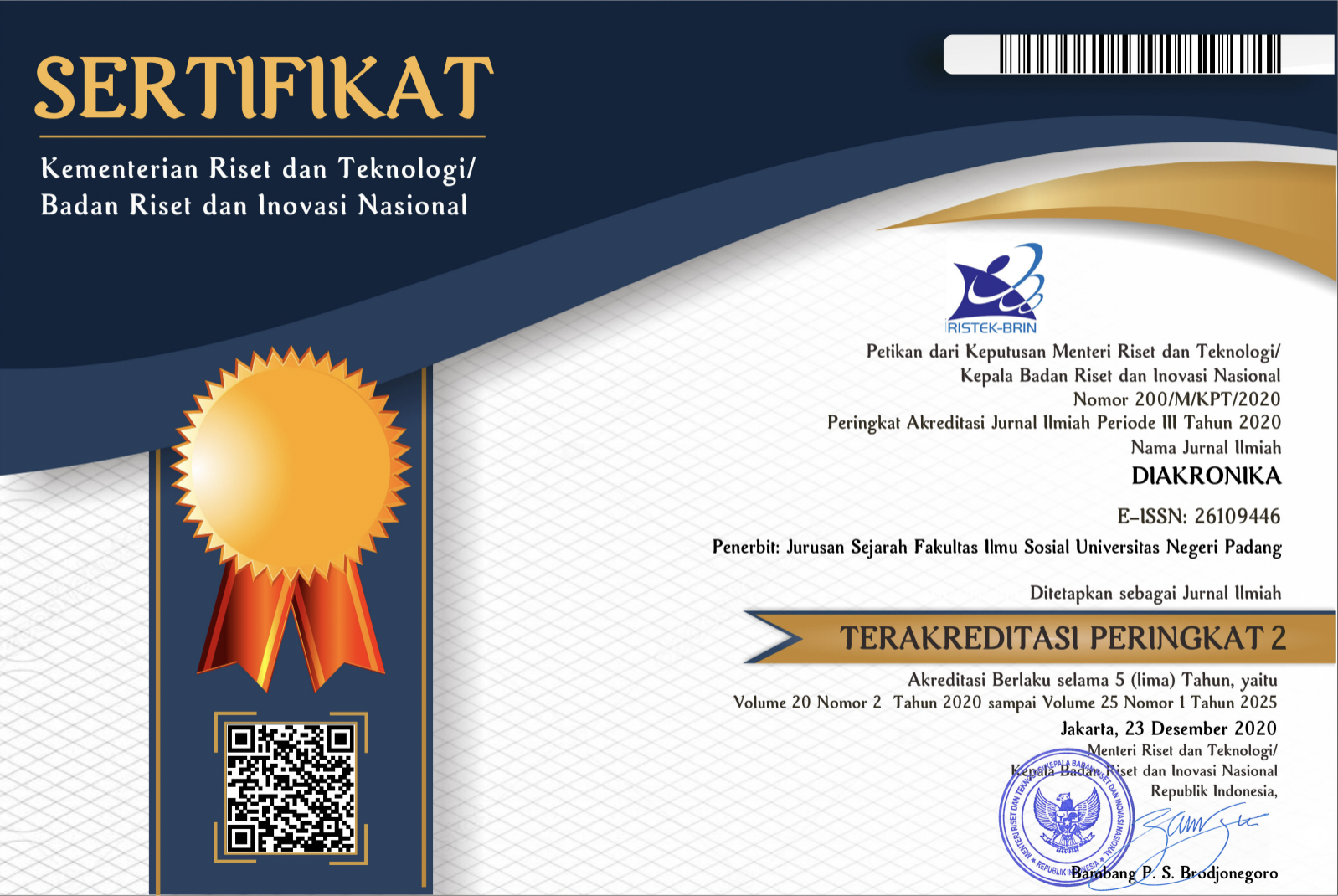Historical Values and Character Education Based on Batu Urip Local Wisdom as a History Learning Resource
Abstract
The declining interest of the younger generation in history lessons in the digital era is a serious challenge to preserving national identity and forming national character. Many students find history boring and irrelevant. To answer this challenge, an innovative approach based on local wisdom that is contextual and meaningful is needed. The Batu Urip site in Lubuklinggau, which has been designated as a Cultural Heritage Village, holds potential historical and character values that can be integrated into history learning. This research explores the values of history and character education from Batu Urip's local wisdom as a 21st-century learning resource. The method used is historical research, which includes heuristics (data collection through field observations, interviews with traditional leaders, and archival studies), source criticism, interpretation of character values, and historiography writing. The results show that the Batu Urip site contains values such as gotong royong, social responsibility, and love for the environment, which are reflected in artefacts and oral traditions of the local community. The novelty of this study lies in developing interactive digital history learning media based on local values. The study's conclusion confirms that integrating local wisdom in history learning effectively fosters cultural identity, positive character, and students' interest in globalization.
Downloads
References
Ambarwati, D. S., Rohidi, T. R., Syakir, Syarif, M. I., & Pamadhi, H. (2024). The noble character-based learning in the ornaments of Kraton Yogyakarta: A visual analysis of Javanese cultural heritage. Cakrawala Pendidikan, 43(1), 74–87. https://doi.org/10.21831/cp.v43i1.66310
Askarova, N., Shalamova, O., & Voronova, L. (2024). The factors in the decision-making of high school graduates about higher education in the digital era. International Journal of Evaluation and Research in Education, 13(4), 2039–2048. https://doi.org/10.11591/ijere.v13i4.27618
Bandura, A. (1997). Self-efficacy - The exercise of control. New York: W.H. Freeman and Company.
Bunari, B., Fadli, M. R., Fikri, A., Setiawan, J., Fahri, A., & Izzati, I. M. (2023). Understanding history, historical thinking, and historical consciousness, in learning history: An ex post facto correlation. International Journal of Evaluation and Research in Education (IJERE), 12(1), 260. https://doi.org/10.11591/ijere.v12i1.23633
Ciptandi, F., & Arumsari, A. (2024). The existence of aesthetic transformation in traditional batik colors is based on a review of the memetics theory (Case study: Traditional batik in Tuban, East Java, Indonesia). Harmonia: Journal of Arts Research and Education, 24(1), 177–191. https://doi.org/10.15294/harmonia.v24i1.43243
Creswell, J. (2016). Introducing Qualitative Designs. In 30 essential skills for the qualitative researcher. SAGE Publications. http://e.pub/8y1g2myyze0jdol8znd4.vbk/OEBPS/s9781483398952.i1798-print-15411267%0A%0A
Djubaedi, D., Rohadi, T., Hidayat, A., & Kodama, Y. (2024). Analysis of entrepreneurship core competency and curriculum integrated with local culture and products. International Journal of Evaluation and Research in Education (IJERE), 13(5), 3526. https://doi.org/10.11591/ijere.v13i5.28147
Ervana, D. S., Raharjo, R., Munasir, M., Hariyono, E., & Utama, J. A. (2024). 3D Model's online modules' effectiveness in practicing mastery of solar system conceptual knowledge. Turkish Online Journal of Distance Education, 25(3), 76–96. https://doi.org/10.17718/tojde.1333975
Fatmawati, I. (2025). Transformasi pembelajaran sejarah dengan deep learning berbasis digital untuk gen Z. Revorma: Jurnal Pendidikan Dan Pemikiran, 5(1), 25–39. https://doi.org/10.62825/revorma.v5i1.140
Firza, F., & Aisiah, A. (2019). Error of proposal writing by students. 3rd Asian Education Symposium (AES 2018).
Foy, K. (2021). Digital games-based learning for history–problem solving or problematic? Education in the North, 28(2), 115–133. https://aura.abdn.ac.uk/bitstream/handle/2164/16616/Foy_EITN_digital_games_learning_VOR.pdf?sequence=1
Grossi, E. (2020). Insegnare storia con II curriculum. Didattica Della Storia : Journal of Research and Didactics of History, 2, 258–271.
Gumilar, G., Rosid, D. P. S., Sumardjoko, B., & Ghufron, A. (2023). Urgensi penggantian kurikulum 2013 menjadi kurikulum merdeka. Jurnal Papeda: Jurnal Publikasi Pendidikan Dasar, 5(2), 148–155. https://doi.org/10.36232/jurnalpendidikandasar.v5i2.4528
Haydn, T. (2012). History in schools and the problem of ""the nation."" Education Sciences, 2(4), 276–289. https://doi.org/10.3390/educsci2040276
Irvy, I. I. (2020). Understanding the learning models design for Indonesian teacher. International Journal of Asian Education, 1(2), 95–106. https://doi.org/10.46966/ijae.v1i2.40
Isnaini, D., Larasati, D. A., & Prasetyo, K. (2022). Pengaruh Pemanfaatan Museum Mpu Tantular Sebagai Sumber Belajar IPS Terhadap Peningkatan Hasil Belajar Sejarah Siswa. Dialektika Pendidikan IPS, 2(2), 327–334. https://ejournal.unesa.ac.id/index.php/PENIPS/article/view/48836
Jumardi. (2020). Relevansi nilai-nilai sejarah lokal dan nasionalisme generasi muda. Jurnal Pendidikan Sejarah, 9(1), 74–89. http://journal.unj.ac.id/unj/index.php/jps/article/view/14269.
Karima, E. M., Basri, W., & Astriani, F. (2021). Educational Theory Application In History Learning. Santhet: Jurnal Sejarah, Pendidikan, dan Humaniora, 5(2), 115-124.
Karima, E. M., Nurlizawati, N., Firza, F., Abidin, N. F., & Ibrahim, Y. (2024). Reducing Cognitive Bias of Pre-Service History Teachers through Augmented Reality. JOIV: International Journal on Informatics Visualization, 8(1), 520-525.
Kenedi, A. K., Sujarwo, Firdaus, F. M., & Purnomo, Y. W. (2025). Utilization of digital technology- based learning on computational thinking ability of elementary school students: A Meta-analysis study. Educational Technology and Society, 28(1), 18–38. https://doi.org/10.30191/ETS.202501_28(1).RP02
Kolesnikova, E. M., & Kudenko, I. A. (2023). Male educators in pre-school education: Recognition or anxiety? Integration of Education, 4(27), 646–668. https://doi.org/10.15507/1991-9468.113.027.202304.646-668
Kusuma, I. G. Y. P., & Mardiana, I. W. (2023). Krama bali “Let Go”: Menjadi masyarakat melek teknologi dan informasi. Jurnal Bali Membangun Bali, 4(1), 14–25. https://doi.org/10.51172/jbmb.v4i1.243
Lafifa, F., & Rosana, D. (2024). Innovations in assessing students' digital literacy skills in learning science: Effective multiple choice closed-ended tests using the Rasch model. Turkish Online Journal of Distance Education, 25(3), 44–56. https://doi.org/10.17718/tojde.1364528
Lickona, T. (1991). Educating for character, mendidik untuk membentuk karakter. Jakarta: Bumi Aksara.
Lionar, U., Supriatna, N., Mulyana, A., Winarti, M., Sumaludin, M. M., & Syafrina, Y. (2024). Historical literacy in social studies learning at junior high school: Analysis of implementation and challenges. Indonesian Journal of Social Science Education (IJSSE), 6(2), 97. https://doi.org/10.29300/ijsse.v6i2.3953
Mazid, S., Prasetyo, D., & Farikah, F. (2020). Nilai-nilai kearifan lokal sebagai pembentuk karakter masyarakat. Jurnal Pendidikan Karakter, 10(2), 249–262. https://doi.org/10.21831/jpk.v10i2.34099
McLaren, H., Jones, M., & Patmisari, E. (2023). Multicultural quality of life: experiences of a south australian muslim community amid the COVID-19 pandemic. Indonesian Journal of Islam and Muslim Societies, 13(1), 57–84. https://doi.org/10.18326/ijims.v13i1.57-84
Misnah, Arafah, B., Bahri, Usman, S., Ratu, B., Nurwahyuni, & Ruslin. (2024). Lore Lindu culture-based education learning development for elementary school students. International Journal of Learning, Teaching and Educational Research, 23(6), 620–639. https://doi.org/10.26803/ijlter.23.6.29
Mohammadi, M. (2023). Digital information literacy, self-directed learning, and personal knowledge management in critical readers: Application of IDC Theory. Research and Practice in Technology Enhanced Learning, 19, 004. https://doi.org/10.58459/rptel.2024.19004
Mustaqim, I., Setyosari, P., Kamdi, W., & Ulfa, S. (2024). Building the foundation for creativity and collaboration: Knowledge sharing learning models. Cakrawala Pendidikan, 43(1), 262–272. https://doi.org/10.21831/cp.v43i1.60380
Nurdin Kamil, Yudhi Esa Saputra, & Raeh Niken Baghiroh. (2022). Efektivitas Bahan Ajar Pendidikan Multikultural Terhadap Nasionalisme Mahasiswa Pendidikan Guru Sekolah Dasar. Jurnal JUPISI, 1(1), 11–17.
Padiatra, A. M. (2020). Ilmu sejarah : Metode dan praktik. Gresik : CV. Jendela Sastra Indonesia Press.
Putnam, R. D. (2000). Bowling alone: The collapse and revival of American community. New York: Simon & Schuster.
Rakhman, F. (2023). Pengaruh pendidikan multikultural terhadap karakter siswa dan kecakapan berwirausaha peserta didik. Jurnal Elementaria Edukasia, 6(3), 1057–1065. https://doi.org/10.31949/jee.v6i3.6567
Ratih, D., & Suryana, A. (2020). Nilai-nilai kearifan lokal leuweung gede kampung kuta ciamis dalam mengembangkan green bihavior untuk meningkatkan karakter mahasiswa. Jurnal Artefak, 7(2), 79. https://doi.org/10.25157/ja.v7i2.4199
Ríos Cubas, M. A., Grijalva-Salazar, R. V., Paiva, E. B., & Salazar, C. R. R. (2024). Happiness in organizations and its effect on the culture of entrepreneurship in students of a university, lambayeque region, 2022. Academic Journal of Interdisciplinary Studies, 13(4), 99. https://doi.org/10.36941/ajis-2024-0102
Roberts, L. (2016). Deep mapping and spatial anthropology. Humanities, 5(1), 5. https://doi.org/10.3390/h5010005
Selamat, K., Adripen, A., & Jamaluddin, J. (2022). Character Education: Comparison Analysis Between The Thinking of Ki Hajar Dewantara and Abdullah Nasih Ulwan. Ta'dibTa'dib, 25(2), 273. https://doi.org/10.31958/jt.v25i2.6856
Sousa, M., Andrade, J., de Castro Rodrigues, A., Caridade, S., & Cunha, O. (2024). The effectiveness of intervention programs for perpetrators of intimate partner violence with substance abuse and/or mental disorders: A systematic review. Trauma, Violence, and Abuse. https://doi.org/10.1177/15248380241270063
Sukmana, W. J. (2021). Metode penelitian sejarah. Jakarta. Seri Publikasi Pembelajaran, 1(April), 1–4. http://jurnal.uinbanten.ac.id/index.php/tsaqofah/article/view/3512
Susetyo, B. & R. (2021). Kota lubuklinggau dalam kurun waktu 1825-1948. Criksetra: Jurnal Pendidikan Sejarah, 10(1), 14–29. https://doi.org/10.36706/jc.v10i1.12902
Tan, P. S. I. (2022). Modern Democratic Family: An Ethical And Integrity Private Place to Grow. QALAMUNA: Jurnal Pendidikan, Sosial, Dan Agama, 14(1), 691–706. https://doi.org/10.37680/qalamuna.v14i1.4746
Ubaidillah, U., & Marpuah, S. (2021). Interrelation of religion and culture in gunungan tradition cosmology: Islamic and Javanese perspectives. Karsa: Journal of Social and Islamic Culture, 29(2), 34–55. https://doi.org/10.19105/karsa.v29i2.3869
Wasino, & Hartatik, E. S. (2018). Metode penelitian sejarah (Dari riset hingga penelusuran. In Seri Publikasi Pembelajaran.
Yuan, Z. (2024). From Mechanization to Ecologization: A Study of Teaching Organization and Management Models Driven by Self-Organization Theory in Chinese Universities. SHS Web of Conferences, 190, 02024. https://doi.org/10.1051/shsconf/202419002024
Yuliana. (2019). Metode penelitian pendidikan. Remaja Rosda Karya.





